#the reason all americans are obsessed with this despite it being objectively relevant to so few of us is:
Explore tagged Tumblr posts
Text
every day I log on here and all the blue dog democrat Tolkien/Greek tragic poetry fangirls on my dash whom I follow for reasons other than agreeing precisely with their politics (most are very nice and smart and in either medical research or vet tech) are writing paragraphs on paragraphs about how important it is to VOTE in the upcoming presidential election, and don't listen to those nasty nasty tankies who are actually Russian agents (? unclear) trying to get you to throw your vote away, and how this is the most important election of our lifetimes (again, I guess) and as my eyes sort of glaze over I scan their post for the words Arizona, Georgia, Michigan, Nevada, North Carolina, Pennsylvania or Wisconsin, none of which are present. which is so so so funny. like what an absurd situation we are in. imagine you're an insane person and you're preaching outside the subway entrance about how redheads with the BRCA gene NEED to make sure to not spend too long sunbathing topless or they can get skin cancer that metastasizes to breast cancer but you're just saying it to everyone who walks by. or your husband NEEDS to pick up milk on the way home but instead of calling him you just lean out the window with a megaphone. or your roommate has the only set of spare keys to the storage unit but you're just tapping strangers on the shoulder at a Kinko's across town going "can you unlock the storage unit so I can get the carpet shampooer out of there, the cat threw up". my metaphors are tortured here but the explanation for this behavior is mysterious. and we're all doing it kinda. and we all just pretend it matters too. like it's considered the insane position to respond to presidential election discourse with "this entire discussion is completely moot and will remain that way for 90% of USA citizens unless we miraculously grassroots election reform on a scale that probably hasn't been possible since the 1800s" despite that being objectively correct and inarguable
forget Europe, i genuinely believe most of the American votescolds on here don't know how the electoral college works either lmfao
#the reason all americans are obsessed with this despite it being objectively relevant to so few of us is:#IDENTITY POLITICS#voting in the presidential election is pointless unless you live in one of kf those seven states#BUT!!!!!#being the Type of Person who either votes or doesnt vote is immediately understood by every idiot american like me to be deeply meaningful#to the extent that questions of irl effects of voting are now secondary to the central disagreement#this is very funny#also we throw baby tantrums if forced to confront our lack of agency
438 notes
·
View notes
Text
Episode 40 Review: In Which Matt Calls Out Jean Paul (Redux)
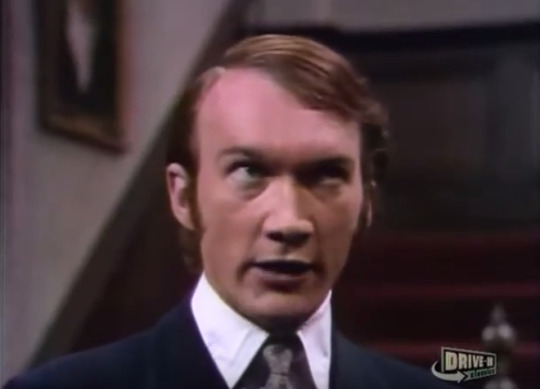
{ YouTube: 1 | 2 | 3 }
{ Full Synopses/Recaps: Debby Graham | Bryan Gruszka }
Welcome back to my Garden of Evil, the blog where I review and affectionately snark on Canada’s own all-American TV series, Strange Paradise. To my shock, Danny Horn of Dark Shadows Every Day (who introduced me to this delightfully crazy soap with his far more critical reviews) is back to posting more frequently than I do, which isn’t really relevant to this post save that I would not have expected it a year ago. (But then, there are many, many things that happened over this past year that I did not expect.) I would have posted this one sooner, but some urgent matters came up last week and I had to postpone.
Four episodes have passed since eccentric billionaire Jean Paul Desmond’s disastrous failed séance to contact his beloved late wife Erica. Medium and Conjure Woman Vangie Abbott has recovered from her injury, she and Raxl have tried (unsuccessfully) to decode the message in the sand writing box, and now Jean Paul insists on holding another séance! The other characters are trying to figure out how and why the ceremony was disrupted: most accuse Jean Paul of trying to murder them with the falling chandelier, while Vangie announces during the opening recap that she suspects the Reverend Matt Dawson of being a disruptive influence because of his disbelief in voodoo. Now sparks fly once again as another argument erupts between the Reverend and Jean Paul at an emergency meeting in the Great Hall.
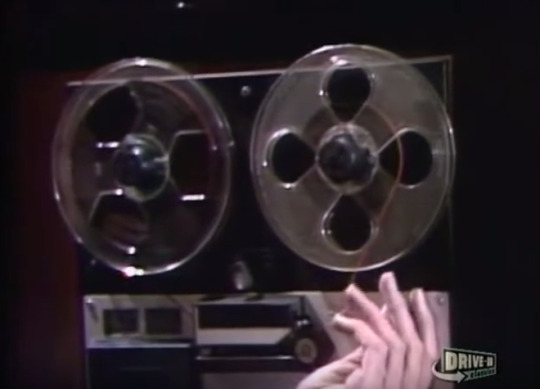
Now, let’s begin.
We open with Jean Paul’s first tape recorder journal entry in a while, which is an exposition device that I had been missing mostly because I like mooning over Colin Fox while listening to his gorgeous voice:
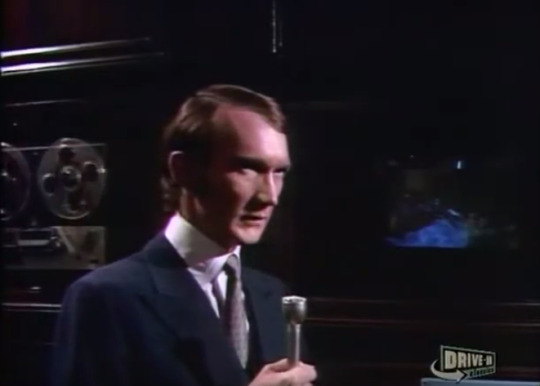
Jean Paul: "Erica, my sweet wife, until the day comes when science can restore you to me, can release you from the cryonic suspension colder than ice, as cold as my empty life, I will continue trying to contact you through a séance. You must know the great effort I am making to protect you! But was the evil of Jacques Eloi des Mondes enough to prevent us from making contact at the séance that failed? Erica, believe me! I fought him with all my strength! I held him at bay, but he could not have got through unaided! These people in this house, Erica, I have been thinking about them: are they in consort with the Devil? Which one prevented me from hearing your sweet voice again, my Erica? Which one? If I knew-"
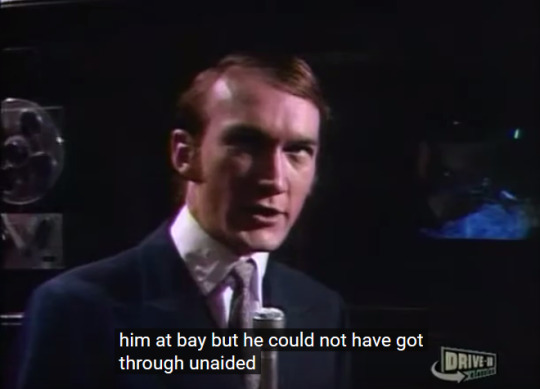
Caught him reading the Teleprompter! (That happens a lot in this episode, by the way.) Also, have I ever mentioned how much I love the lighting in his monitor room?
He stops recording when he sees Holly on the monitor, searching once again for that sweet secret passage in the crypt that she overheard the Reverend mention several episodes ago. Freaking out again over the possibility of danger to Erica’s cryonics capsule, he rushes down to the Great Hall and declares an emergency meeting:
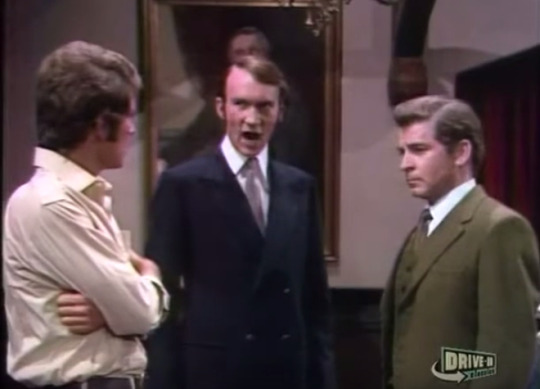
Jean Paul shouting at his detained guests.
"Reverend Dawson, Mr. Stanton, I'm beginning to realize that you have not fully grasped my ruling!" Jean Paul shouts in his most pompous tone. "Now, to each and every one of you, this is most important, and how important it is you will all find out!"
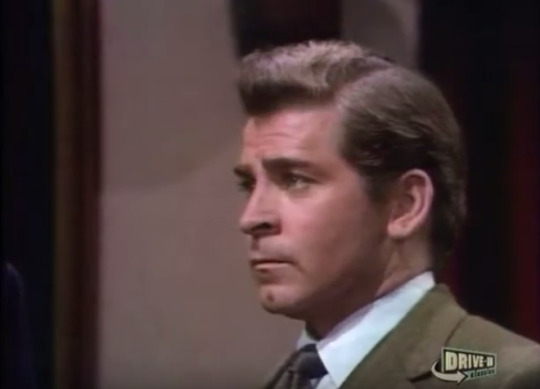
Matt having a scared. I don’t usually find Dan MacDonald cute, but I think he is in this shot.
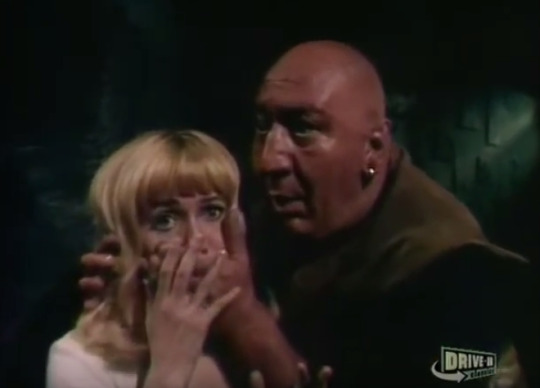
Quito guarding Holly as she hides in the crypt.
"EVERYBODY!” the Master of Maljardin shouts. “EVERYONE WITHIN THE SOUND OF MY VOICE!" [Line flub? His wording is odd.] "EVERYONE! COME TO THE GREAT HALL! DO YOU HEAR ME? EVERYONE IN THIS HOUSE! THIS IS JEAN PAUL DESMOND CALLING! COME TO THE GREAT HALL AT ONCE! YOU TOO, HOLLY MARSHALL! NOW, ONCE AND FOR ALL, YOU WILL ALL GET THE MESSAGE!"
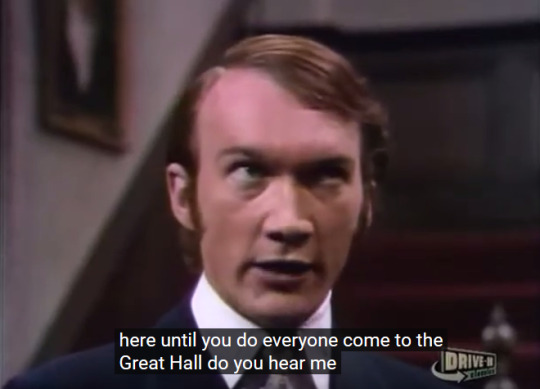
Jean Paul’s crazy eyes in this scene indicate that he means business.
Everyone gathers in the Great Hall, save Holly and Quito (who are hiding in the basement), Dan Forrest (who is probably in the tub), and Raxl (who isn’t there because Cosette Lee had the day off). Dr. Alison Carr is particularly annoyed, because she could be spending this time researching how to resurrect Erica, but instead is stuck listening to her brother-in-law’s latest hissy fit. Oddly enough, even though Jean Paul acts like a complete ass in this episode, Fox-C looks even more stunning than usual. I can’t explain why, but to me he looks especially handsome during Weeks 8 through 11 of the show. That certain je ne sais quoi of his just comes out particularly strongly during this period.
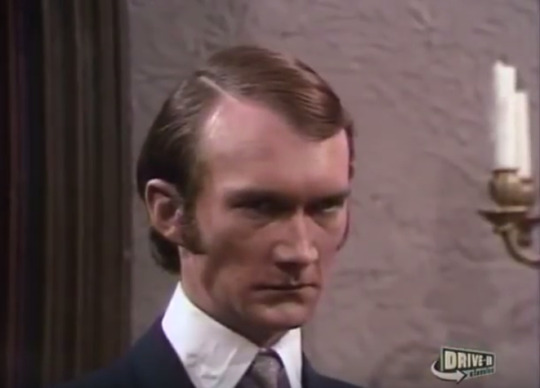
Jean Paul is so angry that you can see his jaw tensing.
Of all the detained guests in the room, he chooses to pick a fight with Matt, because that worked out so well for him five episodes ago. Elizabeth finds this highly amusing and comments with one of her best lines:
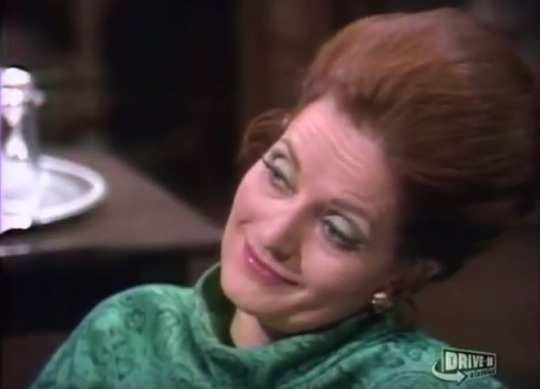
Elizabeth: "It seems to be your opportunity to entertain, Reverend. May I suggest Song of Solomon?"
Jean Paul doesn’t laugh, despite it being arguably the funniest joke anyone other than Jacques has made so far. I, too, want to hear Matt read from the Song of Solomon. Perhaps he has recorded a sermon about it for his album:
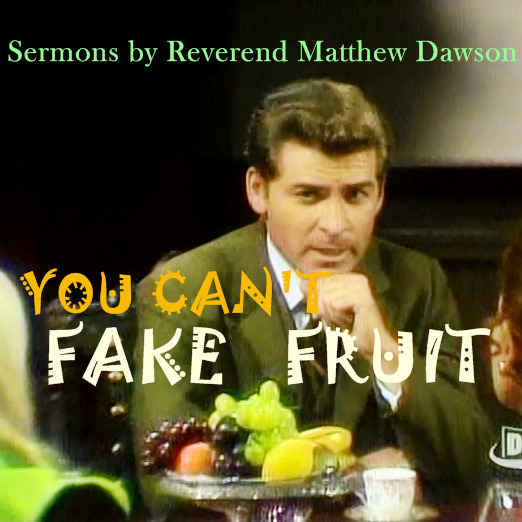
Matt’s album, You Can’t Fake Fruit, featuring his sermon “Wherever God Builds a House of Prayer, the Devil Builds a Chapel There” and selections from the Song of Solomon.
I’m not going to recap or quote their entire fight blow by blow, because I just don’t feel like it--and besides, these kinds of overly dramatic yelling matches are more fun to watch for yourself. However, I will note some highlights:
Matt suspects Jean Paul of murdering Dr. Menkin because of how soon he died after Erica. “Who can say how he died?” he asks as a rhetorical question before proclaiming overconfidently, “There, your control over this island begins to disintegrate!”
He also continues to oppose the notion that the Devil caused any of the events on the island, including the chandelier falling: “The chandelier falls, and it’s blamed on the Devil. And you accept these...superstitious reactions of a few, which are driving all of us beyond the bounds of reason!”
There’s a lot of focus on Holly, as you might expect, given that she‘s been searching in the crypt and also given Matt’s obsession with her. I’m glad he’s trying to protect her from Jean Paul now, even though I will always ship him with his right hand.
Alison stands up to Jean Paul and leaves in the middle of the argument. Good for her! Of course, after she leaves, Jean Paul has to passive-aggressively announce to everyone else that she will regret it.
Vangie tells Jean Paul and Matt that “when a devil works through a man, what he does is not an accident,” referring to the time that Dan allegedly damaged the cryocapsule. Jean Paul latches onto this idea, which Matt objects to because he believes it’s a ploy to turn everyone on the island against each other. So Jean Paul accuses Matt next of evil, which is not a question that most people will answer honestly. Ask Jacques if he’s evil and he will openly admit to it; ask someone like Elizabeth, on the other hand, and she will deny it.
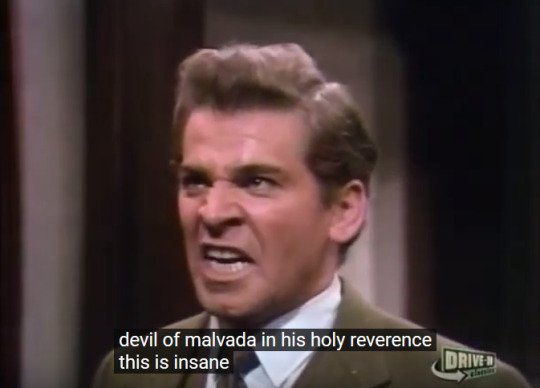
Matt being what the kids today would call “a mood.”
Vangie on Matt: “Because he is a man of the cloth--a religious man--he made the contact [with Erica], but because of his disbelief in the spirits, the chain was weakened, the contact breaks. I would say that whenever the Devil is loose, anything or anyone can be his tool.”
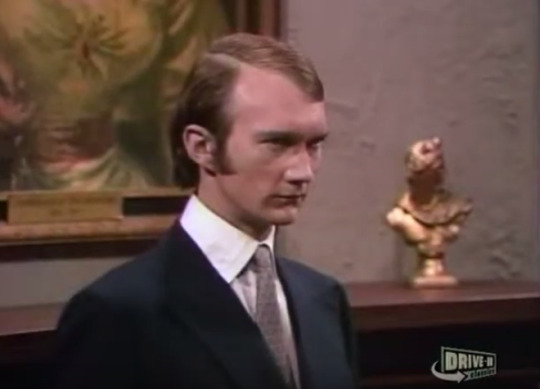
I would say that Jean Paul in this episode is a tool, albeit a very handsome one.
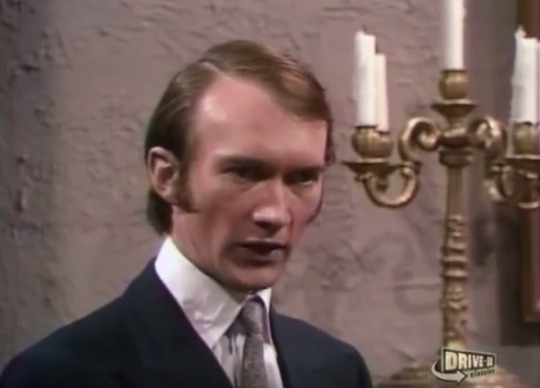
Even his anger can’t disguise his cuteness.
Jean Paul ends the argument by threatening to punish Holly for invading the crypt. “Now you will see what happens to those who intrude on Erica’s resting place,” he tells the others and Elizabeth responds with this interesting, cryptic line:
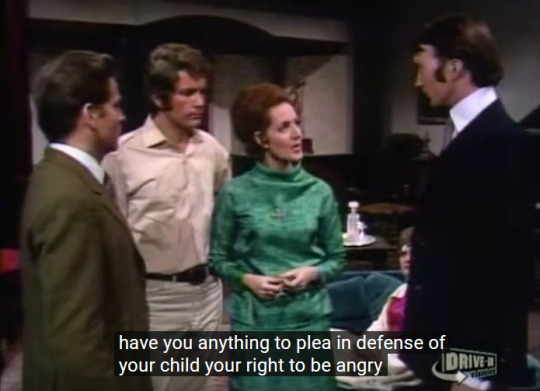
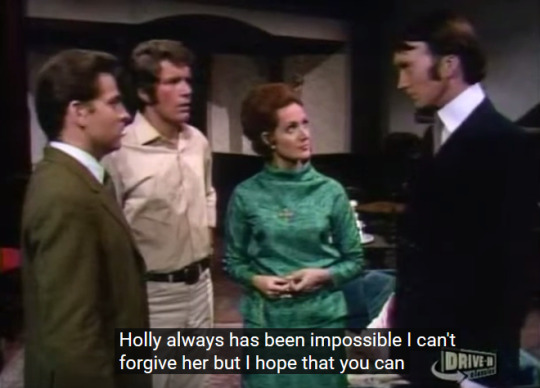
So she approves of Jean Paul’s anger at her “impossible” daughter, but she doesn’t want him to punish her? Also note that she is eerily calm when she delivers this line.
In the next scene, Jean Paul gives Holly some serious mixed messages along the lines of the time my grandfather (with whom I used to live) told me “don’t worry about it” when he noticed my cat scratching at my bedroom door, then threw a fit over the (barely) damaged carpet a few hours later. I moved out of his house two and a half years ago but, up until recently, I got nervous any time anyone told me not to worry about something, because he’d often say things like “don’t worry about it” and “take it easy” shortly before he lost his temper over the very same things he told me not to worry about. In a similar vein, Jean Paul first tells Holly to “go ahead” into the crypt, only to then start ranting about how he thinks that some people on the island want the cryocapsule to break down and want to tell the authorities about what he’s doing on Maljardin.
“Now, what were you looking for, Miss Marshall?” he asks her menacingly after his rant.
“I wouldn’t touch that!” she replies, referring to the capsule. “I want you to bring your wife back to life!”
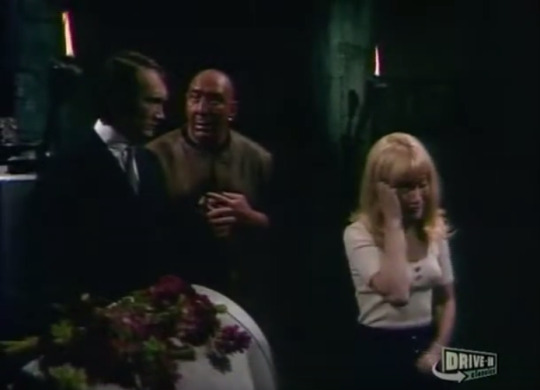
“Then what were you here for!”
“Looking for a way out!” She turns away from him, clutching her head. “Trying to get away from all this. I can’t stand it anymore!”
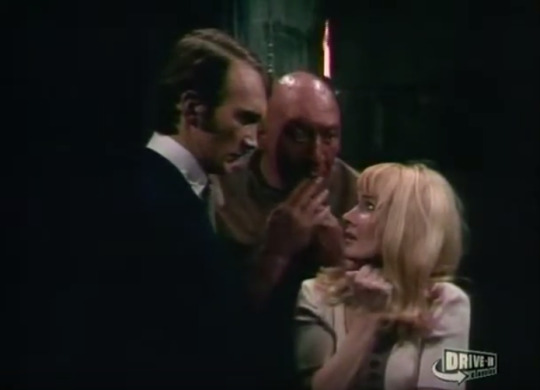
“I am going to have to make an example of you,” Jean Paul threatens.
“I was only looking for a secret door,” she protests, then explains how he (actually Jacques) led her down there to show him where she thought the secret passage was three episodes ago.
Before he can respond to her, Alison comes rushing down to the crypt to tell him about the notes of Dr. Menkin’s that Jacques left in her lab in Episode 38, which cover part of the previously missing six-week period of his experiments:

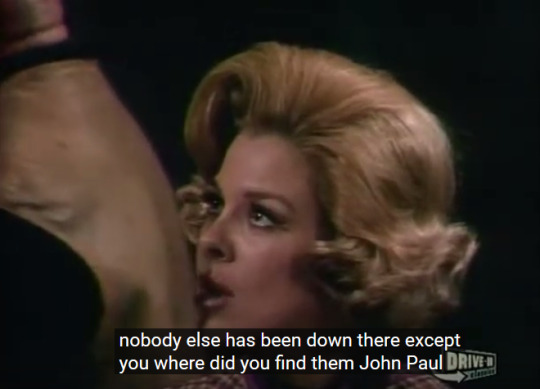
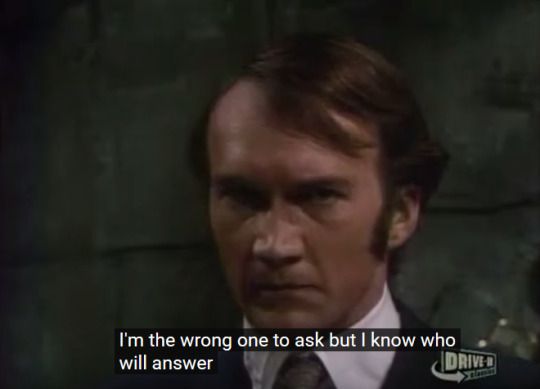
Sure, Jacques *might* answer, but only if he feels like it.
Jean Paul tells Alison, “guard these [notes] with your life,” and the episode ends, which means it’s time to discuss the Lost Episode summary. Normally, I do so in either the introduction or at a point in the episode where a plot point was changed, but here the events of the original episode differed so much from those of the final aired version that I decided to discuss them after my recap.
The Lost Episode 40
To begin, here is the summary for the original Episode 40:

Source: The Plain Dealer (November 7, 1969), p. 72.
So the second séance originally took place in this episode and involved a conflict between two spirits. But who? We know for certain the identity of one of these spirits, courtesy of these summaries for Episodes 41 and 42, respectively:
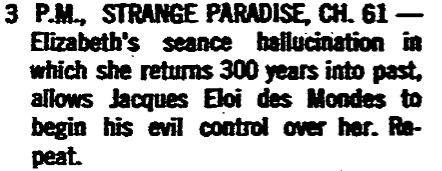
Source: Ibid, p. 84.
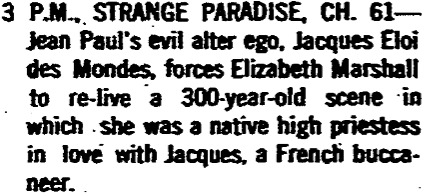
Source: Ibid., p. 88.
A slightly longer version of the latter summary from The Fitchburg Sentinel names this priestess Tarasca, the same figure who appeared in a puff of smoke in the original Episode 35 and whose existence apparently threatens Alison’s life. While most summaries of the original Episode 44 (including the one in The Plain Dealer) mention hallucinations, this one from The Minneapolis Star (November 13, 1969) specifically mentions that the hallucination took place at the séance:
Holly searches for the secret passageway when her sleeping mother re-lives the happenings at the séance.
So we know the identity of one of the fighting spirits from the second séance, but who is the other? This summary for Episode 38 states that Jacques promised Vangie that he wouldn’t interfere a second time, but can we really rely on him to keep his promises? (I believe that he most likely summoned Tarasca to mess with the second séance on his behalf while technically not getting involved in it himself.) Still, even considering Jacques’ lack of trustworthiness, it would make more sense for the other spirit to be Erica, given that the whole purpose of both séances is to contact her.
Curiously, another thing we know about the second séance is that Matt took part in it, because Vangie told him that Holly would be in danger if he refused. I know I called the summary for last episode boring, but hearing the way Vangie talks about him in this episode has made me rethink my previous dismissal of its importance. If Vangie demanded that Matt attend the second séance, that means that she must not have considered Matt a disruptive influence in the original, or at least not enough to exclude him.
Who else attended the séance? At the very least, Vangie, Matt, Jean Paul and Elizabeth, but logically Raxl and Quito as well because of their involvement in the Conjure Faith. Alison may also have attended, but I doubt it because (1) Vangie prefers séances with either five or seven participants including the spirit and (2) Alison is getting increasingly fed up with Jean Paul and may have refused to take part.
The mention of Holly being in danger also raises an additional question: which spirit was threatening her, Erica or Tarasca? For my attempt to answer that question--which would contain some spoilers if I included it here--you will have to wait for a future analysis.
Coming up next: The Bad Subtitle Special for Week 8, followed by a very special essay comparing Strange Paradise to the H. P. Lovecraft novella The Case of Charles Dexter Ward and its 1963 film adaptation The Haunted Palace. After that, a review of Episode 41.
{<- Previous: Episode 39 || Next: Episode 41 ->}
#strange paradise#ian martin#maljardin arc#week 8#episode 40#review#analysis#crazy eyes#cryonics capsule#genuinely scary episodes#jean paul's monitor room#lost episode summaries#passive aggressive jean paul#scenery chewing#sp and religion#speculation on ian martin's original story#storytime#tape recorder journal#tarasca#teleprompteritis#now with 50% more snark because of jean paul's behavior#i still love him but sometimes he is insufferable
1 note
·
View note
Text
Americans and the straw – a messy love story
Oral fixation is a condition whereas a person have an unconscious obsession with his or her mouth. Often the person feel the need to suck or chew on something all the time. It might take the expression of nail biting and other related habits; like excessive use of straws whilst drinking beverages.
In Freudian psychoanalysis; psychosexual development is a central element of the psychoanalytic sexual drive theory, that human beings, from birth possess an instinctual libido – or sexual energy – that develops in five stages: the oral, the anal, the phallic, the latent, and the genital. Each stage is characterized by the erogenous zone that is the source of the libidinal drive. Freud proposed that if the child experienced sexual frustration in relation to any psychosexual developmental stage, he or she would experience anxiety that would persist into adulthood as neurosis, a functional mental disorder. He argued that adult neurosis is often rooted in childhood sexual fantasy and desire. That is because human beings are born “polymorphous perverse”, infants can derive sexual pleasure from any part of their bodies, and that socialisation directs the instinctual libidinal drives into adult heterosexuality.
The first stage of the psychosexual development is the oral stage, spanning from birth until the age of one year, wherein the infant’s mouth is the focus of libidinal gratification derived from the pleasure of feeding at the mother’s breast, and from the oral exploration of his or her environment, i.e. the tendency to place objects in the mouth. The id (the disorganized part of the personality structure that contains a human's basic, instinctual drives. Id is the only component of personality that is present from birth.) dominates, because neither the ego nor the super ego is yet fully developed, and, since the infant has no personality (identity), every action is based upon the pleasure principle. Nonetheless, the infantile ego is forming during the oral stage; two factors contribute to its formation: (i) in developing a body image, he or she is discrete from the external world, e.g. the child understands pain when it is applied to his or her body, thus identifying the physical boundaries between body and environment; (ii) experiencing delayed gratification leads to understanding that specific behaviors satisfy some need, e.g. crying gratifies certain needs.
Weaning is the key experience in the infant’s oral stage of psychosexual development, his or her first feelings of loss consequent to losing the physical intimacy of feeding at mother’s breast. Yet, weaning increases the infant’s self-awareness that he or she does not control the environment, and thus learns of delayed gratification, which leads to the formation of the capacities for independence (awareness of the limits of the self) and trust (behaviors leading to gratification). Yet, thwarting of the oral-stage – too much or too little gratification of desire – might lead to an oral-stage fixation, characterized by passivity, gullibility, immaturity, unrealistic optimism, which is manifested into a manipulative personality consequent to ego malformation. In case of too much gratification, the child does not learn that he or she does not control the environment, and that gratification is not always immediate, thereby forming an immature personality. In the case of to little gratification, the infant might become passive upon learning that gratification is not forthcoming, despite having produced the gratifying behaviour. In short: The consequences of an oral psychological fixation may be, (i) orally aggressive: chewing gum and the ends of pencils, etc., (ii) orally passive: smoking, eating, kissing, oral sexual practices. Oral stage fixation might result in a passive, gullible, immature, manipulative personality.
This, naturally, bring us to the subject of straws.
Marvin Stone, the inventor of the modern straw, is said to have got his idea for the modern straw as he sat on his porch drinking a mint julep through a stalk of rye grass in an attempt to avoid getting mint leafs stuck in his teeth. Irritated by the grainy residue of the deteriorating plant stem he started experimenting with wrapping paper around a pencil and glueing it together. Today his invention, patented in 1888, is used in great number: approximately 500 million straws are used throughout the USA every day. The straw represent many things – a personal preference, a modicum of control – but in the realm of conscious thought it is mostly nothing, which is what makes it such a tough habit to break: You never even remember picking it up in the first place. Naturally there must be an explanations for this; such as laziness, clumsiness, mysophobia – or the innate need of sexual gratification. The American society has a strong oral fixation; from insult to the action, the mouth is ever present as proven by the innumerable variations of the expletive “suck my dick” as the insult of choice for a vast number of Americans. The fascination for oral sex is ever present in both pornography; as can be seen, for example, in “Mark’s Head Bobbers and Hand Jobbers,” a very popular – or so I have been told – pornographic franchise, and in everyday life – to the extent that oral sex is not considered by many American teenagers to be sex at all. That this view is shared by adults is proven by the:“I did not have sexual relations with that woman, miss Lewinsky” defense as put forward by then president Bill Clinton in 1998. The reason for this obsession with the male member can surely be found in religion. Infants brought up in a society dominated by the social taboos connected to sex in the Christian faith, and especially so in the mentality of the Lutheran/Protestant variations of Christianity that have an inherent emotional detachment and a greater social stigma regarding sex than Catholicism. Catholicism do regulate sex, make no mistake about that, but the traditional homelands of Catholicism; read the latin countries, have a weather more suited to frivolous behavior and gayeties of mind than the dark and dreary parts of Europe that gave birth to Protestantism. The exception to the rule would be the Irish Catholics that balance out the dreary weather of the Emerald Isle with other means of merriment. But I digress. As the avid reader remembers Freud mentioned the possible neurosis associated with a possible oral psychological fixation as either orally aggressive or orally passive. Among the orally aggressive neurosis mentioned are included “chewing on pencils” and, as many know, the users of straws often chew on the straws during drinking and indeed after the beverage is consumed. The use of straws can equally be seen as a projection to the orally passive neurosis i.e. as a socially acceptable substitute for oral sex, a practice that is often frowned upon when conducted in public. If we then look at the different personalities associated with oral stage fixation; namely passive, gullible, immature, and manipulative personalties we see that these traits are fairly common expressed individually. On rare occasions several or all of the traits can be seen in one person – a relevant example would be the current president of the United States, Donald Trump.
One of the more fascinating aspects of the American psyche, part from the excessive use of straws, is the “jock” mentality; the need for men to be men and that those men that don’t conform to this group-imposed stereotype is chided for being “gay” – indicating that a homosexual man would be “less than a man” This accusation, when seen in the Freudian light of straws in the greater American orally fixated tradition, is so much funnier when considering that the homophobe every-time he orders a a drink and uses a straw nimbly sucks on a long, slender, pneumatically operated, throbbing – metaphorical – cock.
4 notes
·
View notes
Text
The Problem with Thanos Part 2
So the first video is basically about what is actually wrong with Thanos and by extension, Malthusian theory. Today I want to pivot to something a bit more complicated, Thanos as a character and why he is a less good character because he isn’t a racist.

I’ve said before that Thanos is a good character and I think that is basically true but I want to clarify. Thanos is a good character for you know…Superhero movies, where most of the characters at best are a list of consistent traits with a consistent voice and maybe one or two issues that define them . Thanos’s motivations make sense (they are morally and intellectually wrong but it makes sense), he has a general personality template, and he has more complexity than most marvel villains. But there is a larger issue with his attatchment to Malthusian economics, namely that it doesn’t make any sense he’d be so attracted to it.

Let me jump back for a moment here. See, in real life, the Malthusian notions of population control and necessary brutality for the sake of preserving the world’s resources is an ideology that comes with a lot of baggage attached. From the start, Malthusians aren’t just saying we need mass purges to keep population in check, it always comes with a larger ideological view point about which people should be purged. Malthusianism in real life was directed at the Irish, Catholics, and the poor, and theories influenced by Malthus would be directed at African Americans, Slavs, and Jews, and today it tends to be used in the context of India, China, and Africans. While it would be a simplification to say that the Nazi concept of “Useless Mouths” is purely Malthusian, the ideas are linked. Eugenics, Social Darwinism, Imperialism, and Scrooge esc classicism have always been associated with Malthusian though, and that is why this doctrine is still around despite being debunked in the 19th century. Its less a factual ideology as much as a world view, one obsessed with “us vs. them” mentalities and beliefs in “Nature is a warzone” despite the fact that this is not how society works.

Now in theory you could have a debate about Malthusian population control without dipping into the ideologies always associated with it, but in real life…yeah good luck with that. Malthusian economics are like IQ, or Social Darwinism its some people get into to justify their existing racist prejudice, not an ideology that leads them to racism. That is why it always falls apart so easily when you apply real science to it, because it isn’t just a false scientific theory, its using scientific jargon to justify the same old prejudice.

But Thanos is that, he is a Malthusian without any of the baggage, he isn’t racist, classist, religiously intolerant, or a warmonger. Thanks to the power of the plot, his population control method is actually unbiased, unlike real life Malthusians he doesn’t target a specific group as deserving extermination. When Thomas Malthus spoke of necessary population control he wasn’t referring to his own group of middle class Englishmen, he meant the poor, the Irish, and the Catholic. Thanos is truly “Unbias” in this view of extermination, which is equally stupid but lacks the bigotry that comes with Malthusian theory.

Now let’s pretend Marvel actually understood the themes of their own movie and they genuinely wanted to talk about this world view, it is understandable they would want to desperate the idea from the baggage surrounding it, otherwise it is too easy to dismiss it. So while in real life Malthusianism is linked to a bunch of other horrific ideologies, for the purpose of fiction it might be worth debating it on its own merits rather than as part of something else. It’s not much of a debate because its objectively wrong, but I get the idea. Try to argue with the theory on its own terms rather than what it is associated with.

Here is the problem, I’m not sure if it is actually a good thing to separate these ideologies. Cause Malthusianism literally doesn’t make sense if it isn’t linked to a larger world view, and more importantly Thanos doesn’t make sense. What I meant by this is that Malthusianism is basically a rational that bigots come to in order to justify their existing bigots. You embrace Malthus if you already regard the Irish as subhuman, and you need a justification killing 1.5 million of them. Or if you already don’t want to pay taxes for social programs that help the poor, or if you already don’t want to send aid overseas or sell weapons to war zones. It’s not a true ideology so much as it’s a way to make standard selfish bigotry seem more reasonable and palatable. You don’t become a Malthusian because of the strengths of its argument, you become a Malthusian because you already wanted to dehumanize large groups of people and this is a method lets you not come to terms with your own actions. And this is why Malthusians aren’t convinced by evidence, cause its less a scientific theory so much has a psychological defense mechanism.

And that is the problem, Thanos isn’t a bigot, so his attachment to Malthus doesn’t make any sense. There is no reason why Thanos wouldn’t listen to anybody who suggests to him that “Hey this isn’t how like…anything works” or do some damn research on the subject. Which means that Marvel is either
Positing Malthusian theory is correct in the universe of Marvel which is basically saying “In this world, Eugenics is real, but we should do the right thing anyways
Thanos is actually a really dumb guy who fell for the pseudo science and never checked his assumptions. Which you know...isn’t impossible, but that isn’t how he is presented in the film, instead he is shown as a thoughtful if cruel man. If his main flaw is not his indifference but instead his stupidity, then the movie did a very bad job of conveying that

Now this entire time I’ve been giving Marvel the benefit of the doubt and assuming they were doing this on purpose in order to fight back against Malthusian economics, but lets be honest, they don’t deserve that much credit. Which goes back to the earlier post, which is that they keep mistaking Malthusian for Utilitarianism. So it is again presenting killing half the population as “Practical but evil’ vs. the protagonists “Moral but inefficient” but as I mentioned before, this simply isn’t the case. Malthusian theory of population isn’t just immoral, its actively incorrect. But that isn’t how the conflict is framed, when Thanos and Dr. Strange argue, Strange is like “This is wrong because Trillions will die” while what he, a scientist, should be saying is “This is wrong because....that would not fix the problem like...at all”. Because again, Thomas Malthus ideas were debunked in the mid 19th century, the only reason why they continue to be relevant today is that they provide a handy justification for racist practices, and as Thanos is not a racist, it doesn’t make sense that he would believe this.
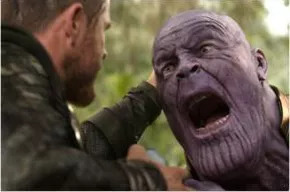
This also leads to another uncomfortable bit, in his discussion with Dr. Strange, Thanos says ‘Titan was like most planets, too many mouths, not enough to go around. When we faced extinction I offered a solution” That is actually quite similar to the “Useless Mouths” rhetoric used in post WWI Germany. Historical context. During WWI, Britain placed German under a blockade which basically put the whole country under siege. Since Germany’s best chance of winning the war was a defensive conflict, slowly giving ground as the allies lost millions and hoping that the ally states would collapse, the steady lack of resources due to this blockade was devestating to the German War effort. While France and Britain could endlessly resupply thanks to their colonies and the Americas, Germany steadily ran out of oil, iron, lead, and food, and the civilian population of Germany, largely unexposed directly to the war, slowly starved, particularly in the “Turnip Winter” of 1916. While there was still food, most of it went to the army, leaving the civilians with nothing. About 763,000 German civilians*, the vast majority of German Civilian deaths during WWI, were due to the famine rather than Allied Weapons. This is not counting those who died of the Spanish Flue epidemic, and an additional 100,000 civilians who died during the negotiation period. This blockade would eventually lead to the fall of the Kaiserreich, as the civilian government eventually overthrew the Kaiser and negotiated the surrender of Germany.

Hitler, a soldier in the trenches and thus not starving, was among many of the German army who felt the civilians had betrayed them, leading to the “Stabbed in the Back” myth. One of the big right wing talking points after WWI was that “we could have won the war, if only we had killed all useless mouths, or “useless eaters”, Lebensunweertes Leben. Specifically the disabled, though this theory would also be applied to a lesser extent to Jews, Roma, Homosexuals, Slavs, and leftists. The term used was basically “Life unworthy of life” and the idea was that the weak Kaiser government should have killed all the ‘worthless” people so that Germany could have won the war, and Hitler’s government used this to justify their own extermination of the mentally ill, the idea was faced with starvation, Germany should have made the “difficult choice” to kill the weak for the strong to survive.
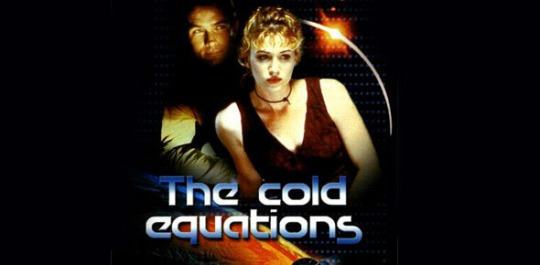
(I hate this fucking story.)
Now obviously this world view is immoral but its also....wrong. The fact is, even if Germany had killed all of the disabled, they would have lost the war anyways, its not like the disabled were using up oil and bullets that would have otherwise gone to the front, nor would it have fixed Germany’s manpower shortage or prevented the US from entering the war. The conspiracy, like most conspiracy theories, came about because German soldiers didn’t want to face an uncomfortable truth. That they had suffered, sacrificed, and fought heroically in a war they never had much chance of winning and all of their pain was in vain. The Useless Eater’s theory was just wrong, it was actively incorrect.
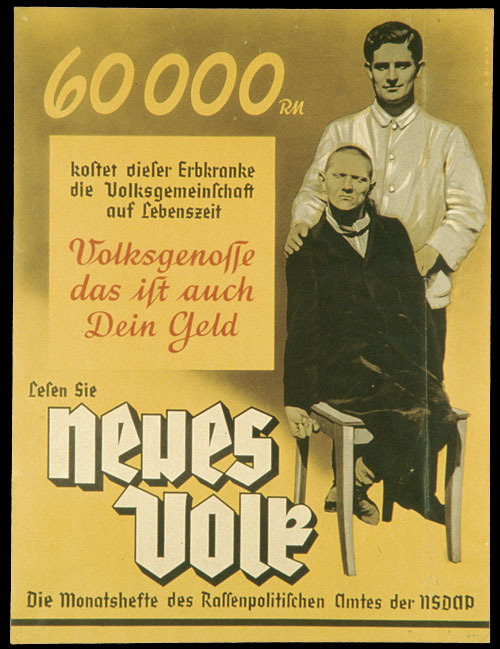
Now how does that relate to Thanos? See I am not calling Thanos a Nazi, unlike Hitler or Malthus, Thanos isn’t targeting any one group, he isn’t saying “We need to kill the Irish, Catholics, Jews or disabled to survive” he is applying that same sort of Life Boat morality in a way real life advocates of it never do, because he is including his own empire and family within the category of “those who can be disposed of” Thanos is looking at a whole vein of right wing thinking which has always existed as a cover for their real policies and taking it at face value and applying it to its own logical extreme, and there could be value in a character like that but...why is Thanos like this? Why is he mindlessly accepting stupid theories he really should be smart enough to just dismiss this nonsense.
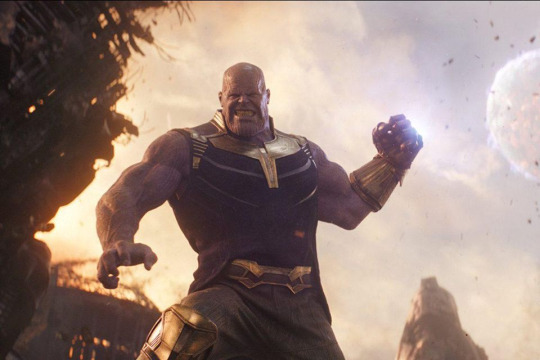
And that lead to my larger issue with Infinity Wars, that I don’t think Disney realizes that Malthus was just morally wrong, but was factually wrong. The conflict is presented as if Thanos’ ideas have merit, and so Thanos is presented as a smart guy who lacks empathy, while the actual problem is that he is incorrect. And it fits the sort of “Status Que” feel of the MCU, where the Super Heroes are mostly preventing a worse future rather than building their own (Black Panther is the exception to this)

(cough)
*That number is actually really disputed, there are some that put the number as low as 300,000 so don’t take that as the final word. I tend to assume higher numbers because I don’t want to underscore the death of civilians, but this is not uncontested.
#Fatal Flaw#Thanos#Diecast Thoughts#avengers endgame#MCU#Marvel#Expanded Universe#Tony Stark#Disney#Superhero Movies#Malthusian Theory#Thomas Malthus#irish potato famine#Utilitarianism#avengers infinity war#Infinity Wars#Endgame#Eugenics#IQ#Pseudo Science#social darwinism#Marvel Studios#Lebensunwertes Leben#Useless Eaters#Useless Mouths#Life unworthy of life
1 note
·
View note
Text
Best Movies of 2018

My favorite movies of the year were rough around the edges. Ambitious, personal works that were messy and real. There were a lot of big films this year that I personally didn't like that much (or at all), but I really love this list of films and I hope you check them out.
Still need to See: Bird Box, Border, Cold War, Custody, Dark River, I Am Not a Witch, On the Basis of Sex, Spider-Man: Into the Spiderverse, Summer '93, The Third Murder, Tyrel, Unsane, Where Hands Touch, Where is Kyra?
Films I didn't prioritize because someone involved has behaved in a way that makes me uninterested in their work: The Ballad of Buster Scruggs, Can You Ever Forgive Me?, The Death of Stalin, The House That Jack Built, A Simple Favor
Really Liked: -Annihilation (dir. Alex Garland) -Blockers (dir. Kay Cannon) -Crazy Rich Asians (dir. Jon Chu) -Destroyer (dir. Karyn Kusama) -Let the Sunshine In (dir. Claire Denis) -Mary Poppins Returns (dir. Rob Marshall) -Mission: Impossible - Fallout (dir. Christopher McQuarrie) -The Rider (dir. Chloé Zhao) -Private Life (dir. Tamara Jenkins) -Skate Kitchen (dir. Crystal Moselle) -We the Animals (dir. Jeremiah Zagar) -You Were Never Really Here (dir. Lynne Ramsay)
Really Really Liked: -Eighth Grade (dir. Bo Burnham) -Happy as Lazzaro (dir. Alice Rohrwacher) -Leave No Trace (dir. Debra Granik) -Love, Simon (dir. Greg Berlanti) -Mary Queen of Scots (dir. Josie Rourke) -Nancy (dir. Christina Choe) -On Body and Soul (dir. Ildikó Enyedi) -Tully (dir. Jason Reitman)
Loved:
10. Black Panther (dir. Ryan Coogler)
Finally. Proof that Hollywood doesn’t have to choose between style, substance, and entertainment. Black Panther was the biggest film of the year and also one of the best. With stunning cinematography by Rachel Morrison, inspired costumes by Ruth E. Carter, and an album of the year worthy soundtrack by Kendrick Lamar, Ryan Coogler has broken through the Marvel machine to make something truly special. And like all the best superhero movies the supporting cast is incredible, Letitia Wright being the obvious standout, along with moral foils Michael B. Jordan and Lupita Nyong'o. This is everything I want from big budget filmmaking and it's such an exciting relief to be reminded that it's possible.
9. The Tale (dir. Jennifer Fox)
The Hollywood Reporter recently published an article about the 16-year-old girl who inspired Woody Allen's Manhattan. The woman, reflecting on her time with the director and known child molester, is unsure how to frame their time together. She was underage and knowing what she knows now about Allen, their affair feels different. But at the time she was in love. Reading this article, I felt overwhelming gratitude for filmmaker Jennifer Fox and The Tale, a painful and important movie about her own teenage love affair, about her own rape. Fox's vulnerability and skill not only make this a great movie, but a truly life-changing experience. There is one moment in particular that uses cinema in a way I've never seen before. This is by no means an easy film to watch, but it's really worthwhile if you can handle it.
8. Dirty Computer (dir. Janelle Monáe & others)
This "emotion picture" available to watch on YouTube strikes such a moving balance between pure joy, harsh reality, and cautious hope. Its very existence is a sign that its optimism is not misplaced. Musicians have become some of our greatest auteurs with voices and stories Hollywood would otherwise ignore. Janelle Monáe along with Chuck Lightning, Emma Westenberg, Alan Ferguson, and Lacey Duke created a film that is at once a sci-fi epic, a visual album, a public coming out, a celebration of queerness/Blackness/femaleness, and an ode to everybody different. This year was bleak and nothing brought me more comfort than this movie, this album, and obsessing over Monáe and star Tessa Thompson's relationship.
7. Good Manners (dir. Juliana Rojas, Marco Dutra)
Come for the lesbian werewolf musical fairy tale genre mashup, stay for the complicated explorations of race, class, and parenthood. This movie is overflowing with so many ideas, cinematically and thematically, it's thrilling to watch it all fit together. It's so rare to watch a movie and have literally no idea where it's going and I will cherish the experience of my first viewing (I literally SCREAMED at one moment in a crowded theatre, seriously) while also hungrily rewatching to unpack everything that's going on. I can't promise it will all work for you, but I can promise you won't be bored.
6. Shirkers (dir. Sandi Tan)
As a teenager Sandi Tan made a feature film with her friends and an enigmatic mentor. Imagined as the start of a Singapore New Wave, their dreams were crushed when the mentor vanished with the film reels. Now decades later, Tan's documentary recalls the experience… with the help of the recovered reels. Part memoir/part mystery/part lost cinema classic, Shirkers is about youthful creativity, exploitation, and so much more. Ultimately this is a portrait of an art form. Within its 95 minutes it encapsulates everything movies can do and everything movies take. It's currently streaming on Netflix and a must-watch for anyone who makes movies or cares about how they're made.
5. Widows (dir. Steve McQueen)
Like a Michael Mann movie if Michael Mann cared about things other than digital cameras, Steve McQueen's cold and stellar heist movie lacks subtlety in all the best ways. Led by Viola Davis this candidate for greatest movie cast ever of all time ever does not disappoint. Everybody is so, so good, and it's thrilling to watch this kind of 1970s American genre film through a point of view that doesn't belong to white men. There's a lot to unpack here, with character, plot, and theme, and I've only seen it once, but that was enough to know that this is a capital G Great movie.
4. The Miseducation of Cameron Post (dir. Desiree Akhavan)
Not every queer person has gone to conversion therapy, but I'd guess most of us have doubted our feelings and our identities. What could have easily been a more serious But I'm a Cheerleader instead finds its own purpose, its own humor, and ultimately exists as a still relevant portrayal of the gaslighting we continue to face for just being ourselves. Chloë Grace Moretz gives one of the best performances of the year as the equal parts cool and vulnerable Cameron and my love for writer/director Desiree Akhavan knows no bounds. NOTE: Sasha Lane plays a character who is disabled and Forrest Goodluck plays a character who is Two-Spirit despite not being so themselves. Considering how good the film is otherwise I dream of a version with a supporting cast who understand the experience of their characters.
3. If Beale Street Could Talk (dir. Barry Jenkins)
Like the masterpiece of a novel it's based on, Barry Jenkins third film is an overwhelming tribute to life in the face of despair. Instead of offering hope, instead of suggesting that being Black in America will someday be easier, Beale Street shows how love, romantic and familial, can provide temporary escape and a reason for being. The entire cast is incredible and gorgeous. Every frame is lush, the score is beautiful, and the moments of joy are as moving as the moments of pain. We are so lucky to be alive while Barry Jenkins is making movies.
2. Shoplifters (dir. Hirokazu Kore-Eda)
I went into Kore-Eda's Palme d'Or winning tribute to chosen family ready to feel grateful for my own chosen family. The friends, mentors, beauticians(!), doctors(!!) who have loved and supported me and made me feel like I wasn't alone these past few years. That happened. But what surprised me was how much it made me appreciate my biological family as well. Like the houses in my favorite TV show of the year, Pose, the makeshift family of Shoplifters ends up being like any other. There are clashing personalities, there are frustrations, there are fights. But more than anything there is care, there is self-sacrifice, there is love. Community is not defined by perfection. Family is not defined by perfection. Kore-Eda has spent much of his career asking the question, "What is family?" and this film provides the least and most satisfying answers.
1. In Between (dir. Maysaloun Hamoud)
I loved my favorite movie of the year so deeply that a one paragraph pitch just won't do. Fortunately, the best site on the entire online, Autostraddle, had me write a gushy review. Read it here or if you're already convinced watch In Between free on Kanopy and then read it: https://www.autostraddle.com/in-between-review-the-super-gay-super-feminist-film-no-ones-talking-about-444114/
Television!
Extremely honorable mentions like how is there so much good TV these all deserve to be in the top ten: BoJack Horseman (S5), High Maintenance (S2), Insecure (S3), Jane the Virgin (S4), Random Acts of Flyness (S1), Sharp Objects, Supergirl (S4), Take My Wife (S2)
10. Killing Eve (S1) 9. Atlanta (S2) 8. The Good Place (S2/3) 7. The Americans (S6) 6. The Bisexual (S1) 5. ACS: The Assassination of Gianni Versace 4. Queen Sugar (S3) 3. Crazy Ex-Girlfriend (S3/S4) 2. Vida (S1) 1. Pose (S1)
#Best Movies of 2018#In Between#Bar Bahar#Shoplifters#If Beale Street Could Talk#The Miseducation of Cameron Post#Widows#Shirkers#Good Manners#Dirty Computer#The Tale#Black Panther#On Body and Soul#Eighth Grade#Happy as Lazzaro#Leave No Trace#Love Simon#Mary Queen of Scots#Nancy#Tully
3 notes
·
View notes
Note
for the critical opinion on ships ask meme: dramione, rethaniel, joshbecca, grebecca?
Ah, yes, let’s see how many people I can piss off in one go. I’ll tackle these in reverse:
Grebecca: Maybe in some alternate universe these two could work out but not in the one we have. They were very toxic for each other and Greg, frankly, deserves better. I think It Was a Shit Show said everything about their relationship that needed to be said. It was terrible and Greg did the right thing by leaving.
While I do think Rebecca loved him, as long her obsession with Josh and her on issues went unaddressed she would’ve continued to string him along and eventually they would’ve hated each other. I think they were a really good example of how love can’t save a toxic relationship and you shouldn’t destroy yourself trying to make a toxic relationship work.
I do think seeing all the shippers who harass Rachel and Aline have soured me further on this ship but I still love Greg as a character. He’s (in my opinion) the most realistically human character the show has had.
Joshbecca: Josh is a sweet guy but he’s not remotely emotionally intelligent enough to be with Rebecca. And frankly, they just don’t have much in common. The main way they connect at all is via his childishness but for Rebecca that’s not healthy (and I’d argue it’s not really healthy for Josh either.)
There’s probably a universe where they could date for a few months and have fun but that’s it. They are just too different and in terms of the actual canon universe Rebecca has beyond treated him awfully and it’s only by the grace of the fact that Josh is the most forgiving and kind character on the show that he doesn’t hate her.
Rethaniel: Oh boy. Are you ever like, “Well, I’m about to say things that literally no one is going to be happy with”?
It’s been an interesting journey tracking my feelings about this ship. On my first watch through I was surprised by how much I was able to like Nathaniel, despite his flaws. But then I rewatched and was better able to analyse his actions (while watching season 3 live it became easy to forget things he had said and done and I didn’t pay attention to fan discussions at all.)
There are definitely Nathaniel moments I like. Actually, I still love his plot in Josh is Irrelevant because I really relate to him getting triggered in that episode for some personal reasons. It’s the only time I’ve found him relatable, though.
The funniest thing is that deciding to check out the CXGF fandom on Tumblr was the thing that really started to bring out my negativity about the ship. Simply because I was stunned to find out so many people... shipped them so wholeheartedly. It made me uncomfortable even though at that point I still hadn’t put an enormous amount of thought into it because frankly: I don’t care about Rebecca’s romantic life at all. It’s not why I watch the show. So my attitude has tended to be “she can have romantic stumbles and bad relationships as long as the end of the show isn’t about her romantic life.”
And I mean, that’s STILL my attitude. I know some people disagree but I’m fine with Rebecca having bad relationships and I know some people REALLY disagree but I think there is value to Nathaniel as a character (DON’T HATE ME LEAH) and deconstructing the privilege and abuses of wealthy straight white men in America.
Now, thankfully, my experience with Rethaniel shippers has all been great and most seem to be lovely people and many of them ARE critical of Nathaniel’s actions. So I don’t hold anything against them, and I’ve been forged in the fires of HP fandom where some truly gross ships are also some of the most popular so...
Anyhow, here’s why I’ve gone from kinda neutral on Rethaniel to them being actually something I’m against:
Look, before we get into any of Nathaniel’s behaviour and meta on his place on the show, I’ll just say: it’s really fucking hard to ignore that every female Jewish fan of the show I’ve interacted with hates Nathaniel. It’s not my place to comment on why that is but when an entire group is like “this dude makes us uncomfortable” I tend to listen.
Meta wise, we now know that Rebecca is Nathaniel’s Josh, aka object of obsession that he’s idealising. Which means that aside from any of his actual behaviour, once Nathaniel can get over that obsession it won’t be healthy for him to continue to interact with Rebecca.
Nathaniel sexually harassed Rebecca while they were trapped in an elevator.
He plotted to deport Josh’s father and to murder Josh’s grandfather so that he could get laid (though it’s debatable whether Nathaniel really thought he would have to go through with these things, I do think if Rebecca had been cool with them he would’ve let them happen and buried any guilt as per usual.)
He repeatedly bodyshames her.
He treats her mental health problems as cute and attractive.
When she breaks up with him he fires her out of spite (something he basically confesses to.)
Rachel Bloom has said that Rebecca is attracted to Nathaniel in part BECAUSE he negs her and that definitely tracks with Rebecca’s low self-esteem. She’s also said that her interactions with Paula’s dad factor why she goes and sleeps with Nathaniel after getting back to West Covina, so erm, unpack THAT.
For me the final clincher is “Nothing is Ever Anyone’s Fault” a song which I should note, I like (as a piece of satire and meta-commentary, which is a case for a lot of the show’s morally not great pieces.) After everything, Nathaniel doesn’t see anything he’s done as wrong. I do think he will eventually but the end of season 3 and the title being “Nathaniel is Irrelevant” to me send a clear message.
I’m baffled that some people think “Nothing is Ever Anyone’s Fault” is a sweet, romantic song when everything about it is the opposite of the message the show is trying to convey. Rebecca and Nathaniel are saying in that moment that part of what has drawn them together is not taking responsibility for their actions and blaming everything on trauma. It’s destructive and toxic, not romantic. And this evidenced by the following scene in the courtroom where Rebecca rejects Nathaniels amorality and chooses her conscience (aka Paula.)
And like, soon I will finish my season 3 reviews and get into why the season 3 finale is genuinely one of my favourite things the show has done (as it was the next missing piece that I wanted the show to cover... they had dealt with what Rebecca’s underlying problems were but not fully dealt with her need to take responsibility for her actions.)
I think there’s hope for Nathaniel as a character. He can grow and be redeemed and learn to use his privilege to help people, rather than using it as a weapon and a shield. But he needs to stay away from Rebecca. I do think they love each other but their love is destructive.
My final thought I want to attach is that... I think there’s something to be said for the relevancy characters like Nathaniel have for Americans. In this country, our real life villains look like Nathaniel and his family. They represent white privilege and and cold, driven capitalism.
It’s not entirely surprising that so many of us find it easy to love Nathaniel and latch onto him as a character. I think it’s something we’ve been conditioned to as a way of coping with life in a capitalist hellscape.
Observe the way people like Elon Musk and Jeff Bezos are treated by many liberals. Jeff is, to be fair, a liberal but he’s also the wealthiest man in the world and his company has some serious ethical problems with how their workers are treated at all levels (it’s not just the people working in the warehouses, I’ve known Amazon programmers in the past and the work conditions are nightmarish and not sustainable unless you are in perfect health and have no personal life.)
And Elon Musk is a libertarian who has donated to Republicans who want to take people’s rights away but he still gets weirdly treated like some sort of liberal icon.
And I don’t want to poison the well too much, but I would like to at least make a cursory gesture at our president, who is a privileged straight white man who openly sexually harassed women, is guilty endless racism, antisemitism, ableism, misogyny and has of course been accused numerous times of sexual assault. A complete list of why our president is awful would require an entire novel to itself...
But someone like our president was able to get elected. Half the country voted him in.
And obviously... Nathaniel isn’t wealthy on the level of guys like that (or he wouldn’t be pissing about with a lawfirm like Whitefeather) and he’s mercifully not a monster like our president. But I do think our need to cope with our environment contributes to liking characters like him. If people like him can be good inside and can be redeemed then maybe there’s hope for this country.
But in reality... people like Nathaniel don’t grow and change. But I believe they can. And, for me anyhow, this is the value I see in Nathaniel. They can send a message to straight, white men about privilege and learning to fight back against the patriarchy that lifts you up. He can be a good person. But his road to that might be a little harder because men like Nathaniel don’t change because privilege protects them. Why change when society itself never allows you to fail?
But I think Nathaniel will grow and change. But I think it’s important he does that on his own. Rebecca can’t be his manic pixie dream girl (even though that’s literally how he sees her.) Rebecca’s journey is her own and it’s not about the men.
#crazy ex girlfriend#at least this is so long that no one is actually going to read it lol#please no one hate me!#Anonymous
5 notes
·
View notes
Text
i used to hate white noise
it was something i read for a book report at some point early in high school, off a huge list of potential books to read. im sure most of my classmates picked names they heard before, or based their choice off of some amount of research or asking around. i just picked white noise off of the name
sometimes i think about things that must have shaped who i am. was it homestuck? was it my extracirriculars? my teachers? all these things i liked
but i think that most of what shaped me was things i didnt like
at some point my assignment with white noise seemed to drag on, and it became something that i needed to joke about to continue to put up with it. i didnt have any friends who were also reading it, though, and i didnt even wonder whether it had a fandom, let alone look for one
some aspects of it have stuck with me in a way thats turned out to be unshakeable. ive read a lot of books for school, but i think of few of them as much as i think of white noise.
i suppose most books i have read are somewhat rarefied in concept. the ones i think of most are usually ones that had some kind of political commentary, or some kind of aspect that reminded me of myself. the things that seem ever-present and inescapable.
but as i get older and as the specificity of ad targetting and marketing becomes more invasive and granular, the themes of white noise become more and more relevant. everything becomes a generic object in a shopping cart, or a looming threat that everyone is responding to with simultaneous hysteria and apathy, or a television in the background of a conversation-- interrupting thoughts with irrelevant but flow-altering noise. a constant butterfly effect of unacknowledged but unavoidable signal, deviating us further from what we were thinking to intend before we lost our train of though
i guess as i get older i also realize that people, as a rule, are frustrating and bizarre and objectionable and idiosyncratic. the constructs of society reinforce and amplify that.
white noise just feels a lot less stupid every day and all my ungotten jokes about it are perpetually coming back to haunt me
also while i tend to claim internally that my pointlessly pseudoanalytical tirades are a side effect of strilondian stridings, just attempting to Become some characters i enjoyed in a comic once
but i think that, being frank with myself:
my tendency to think in unnecessarily complicated symbolism and rely on a variety of systems of thought and philosophies to justify vast conclusion-jumping all for the sake of intrigue or mild “things that make u go hmm” moments probably derives from my youthful exposure to sermons written by pastors desperate to extrapolate their cultural observations and personal pet peeves into full sermons that will permanently integrate into the views and thought processes of their congregation, all on a weekly basis
however, my tendency to direct that symbolic extrapolation at social and economic constructs and then spout off about that shit for several consecutive minutes with no prompting and no expectation for a response ?
thats all white noise babey
theres something hilariously immature about me fixating on the notable fictional, capitalism-obsessed pedants which comprise the new york professors of the college-on-the-hill, deciding somehow that they were cool despite hating their fictional context, and then carrying their patterns of behavior into adulthood despite the fact that this course of action has never served me well.
at this point it would probably be too difficult to shed this tendency, but while rereading white noise it seems sort of clear that even though they are detachedly analyzing the colorful trappings of a superficial, capitalist world, they are just the same as every other person who is subject to the background radiation of the marketing and culture they so curiously dissect
rereading the early words of siskind about the barn was both like a mirror and a grim reminder. he rants and raves about how nobody sees the barn, only the signs about the barn and the photos take of the barn. it is easy to think at first that his concern is that the barn is lost, but then jack amends his narration, saying that siskind “seems immensely pleased by this”
is there a joy that is derived from criticism of the culture that sucks away the actual critical nature of the analysis? does our investment in describing, cataloguing, and naysaying this society’s workings cause us to become subconsciously invested in its persistence?
there is something clearly off-putting about jack’s hitler studies. it seems clear that, while it is assumed that jack is aware that hitler was an atrocious figure, the meticulous cataloguing of hitler’s life and the lives of those around hitler, as well as the enthusiasm for that life necessitated for jack to name his kid fucking Heinrich, seem like they must derive from some kind of inappropriate affection for these figures. it like critical obsession is only the acceptable cousin of admiring obsession. like the person who studies a subject is not immune to the psychological contagion which eminates from that subject
the american cultural studies are housed in the same building as hitler studies and with this sort of retrospective glance at the subject, it seems like the new york professors have an almost inappropriate attachment to their field of expertise. but how else do you become an expert, but through fascination and some level of sincere admiration? do the new york professors see beauty in marketing rather than treachery?
for some reason, (maybe it was my raised-jaded, “it was recently the 00s” brain) i read their discussions as inherently critical when i was younger. this was likely just because they were pointing out the oddities and details of something i had already accepted as ubiquitous. however, pointing at something that is ignored isn’t the same thing as taking a stance on that thing. being aware that there is a trick is no better if you’re still being tricked
all this is sort of to say that rereading this book makes me wonder about how my behavior may be patterned, if not after, at least the same as these characters. my awareness of certain issues is only based on my prior enthusiastic involvement in those issues. some of my awareness in certain issues is based on my current involvement in those issues. does my close examination of these latter issues draw me nearer towards them, like a moth to flame? do i complain about the punishment only to repeat the punished behavior to receive the associated punishment as a sort of backwards reward?
do i go to starbucks just so that i can more effectively gripe about their poor working conditions and their shitty playlists and the alarming late capitalism of their company structure? or do i just go because my friends go there? should i stop spending money there? or would that be a pointless gesture?
i complain about the school system, about workaholicism, about corporatism, about cultish religion, about pedantry, and so on, but i don’t take any meaningful action to distance my own functioning from these things. is it for research’s sake? no. i dont even try to justify it like that. and i don’t think that my willingness to discuss the details of these things distances me from them. i know that i am in the barn photo’s aura. i know that i can’t unsee the signs. but i’m still standing here, eagerly talking down about the people snapping their cameras at the barn
i kind of love white noise
0 notes
Note
Again, a lot of the hatred fro R&J is Hype Backlash. It is bigged up as THE love story, the love story that is superior to all others, due to having the perfectness of their love validated by their deaths. It's shoved down teenagers' throats because its assumed to be universal to all teenagers' lives, despite it really being more of an acquired taste.
It is decidedly not an acquired taste, unless you’re arguing that having an ear for beautiful writing and a basic understanding of love and teen psychology is a “taste” you acquire on your own. There is a threshold in which the greatness of some literature and art in general becomes as close as objective fact as you can possibly get with this sort of thing. Romeo and Juliet belongs in that category. And, as in all great art, it easily offends.
And yes, it is universal, both literally as in the play is known throughout the whole world and figuratively as in it deals with themes that everyone, regardless of culture or income level, can immediately understand with little explanation. Hell, I just had a conversation about my cousin from Spain about Shakespeare some days ago, and she lit up when I mentioned Romeo and Juliet. The Japanese have done it as a short anime series; Bollywood movies rehash the star-crossed lovers theme all the time; the French musical adaptation by Presgurvic is a beloved popular sensation and the American one is a stone-cold masterpiece. I could go on forever, coming up with examples. You’ll have to venture in the most remote impoverished regions to find people who haven’t heard of R&J or Shakespeare.
So yes. It is the greatest love story in that nothing else has gotten close, either in appeal or execution, to the otherwise done-to-death theme. I would actually welcome any suggestions of love stories that best Romeo and Juliet, because I honestly can’t think of any. It’s “shoved down teenagers’ throats,” you say? Good. It deserves to be. Unlike the meathead Greek and Anglo-Saxon epics, the mincing triviality of Austen, the bathetic Romantic writers, and the U.S-obsessed solipsistic twentieth century American writers, this one actually has something meaningful to say that is true to real life experiences and says it in beautiful verse. The only reason why I would not say it is superior to other stories is because comparing works of art with one another, even if they share similar themes, is a tricky business and, when it comes down to it, really unfair to both works. But as far as sheer artistry goes, you’d be hard-pressed to find a better.
Now, if you’re frustrated with the American school system’s obsession with “relevance” and pandering to teenage solipcism and narcissism, I understand. I was completely disgusted by the de-facto brainwashing that occurred in my education classes when I was studying to become an English teacher. Everything has to be relevant for the kids, every lesson plan has to engage them, if your kids are struggling with a book or a play, it’s okay, just show the movie version instead or skip scenes altogether! I’m 100% sure that Romeo and Juliet is kept on the English curriculum only because the protagonists are teenagers and hence, relatable. Otherwise, it would just get dumped in favor of ephemeral YA fiction, which some teachers are assigning to students anyway. They’ve quietly done away with most of Shakespeare’s knottier plays and practically all of Dickens. It is sickening.
Still. Cynical class warfare politics has nothing to do with R&J or its nigh-undeniable quality as literature. One either sees it or one doesn’t. Again, tin ear.
#i come anon#anonymous#ask#romeo and juliet#i would elaborate more but i got to go#but yeah that’s my thinking anyway#rj meta#r&j meta
4 notes
·
View notes
Photo

#CorpMedia #Idiocracy #Oligarchs #MegaBanks vs #Union #Occupy #BLM #SDF #AFRIN #Humanity #DefundTheCPB
The Middle East is approaching a major confrontation
http://rojinfo.com/le-moyen-orient-se-rapproche-dun-affrontement-de-grande-ampleur/
Trump's decision to bury the Iran nuclear deal risks leading to increased tensions. The various regional and international powers present are preparing for a confrontation. We can at least differentiate a more or less stable center: an Iran / Russia bloc, a United States / Israel bloc to which Saudi Arabia and Egypt are attached, and a bloc that stands alone and which plays on all fronts: the Turkey / Qatar bloc. Of course, the United States plays a role in the latter but in a less and less important way. This comes at a time when almost all Islamist rebel troops have fallen in Syria, particularly north of Homs and around Damascus.
What can the United States do after the end of the agreement?
Trump's decision to end the nuclear deal can only have serious consequences. Indeed, it had been put in place to lift the sanctions against Iran for the benefit of large corporations, particularly European, and the Iranian economy. Slowing down the moment when Tehran would get the bomb. (The objective was not to prohibit Tehran from obtaining a nuclear strike force ad vitam aeternam). To bend the European states, Washington has an unstoppable weapon: the dollar. Almost all international trade is with their currencies, they have a clear power of pressure. Especially since they passed a law that allows them to judge and punish any monetary exchange made with the dollar and that even outside the United States. The French example illustrates the question. BNP Paribas sent money from several US embargoed states, including Iran. She pleaded guilty and was fined nearly $ 9 billion to continue working with the Americans. The major French groups knew immediately that the agreement would be validated despite opposition from European states. They started to withdraw, starting with Total, which had considerable interests in Iran, the world's largest gas reserve and fourth largest oil reserve. French companies had also benefited greatly from the lifting of the embargo with several billion contracts signed with Iran in many areas. Hence the obstinacy of the French government, with other European governments, tried to block the agreement at all costs despite near-zero chances.
So what alternatives remain? Mike Pompeo, the United States Secretary of State for Foreign Affairs, known for his anti-Iranian stance, set the conditions for a new deal. They are unacceptable to Tehran as is the complete withdrawal of Iranian troops from Syria. The Secretary of State continued to assert vehemently that Iran will suffer the worst sanctions. Israel and Saudi Arabia have fervently applauded this statement. Israel celebrated it in its own way by heavily bombing Syria. Since there will be no negotiation, what does the United States and its allies intend to do?
The world leader has a problem: while he wants to carry the hardest blow to Iran, he tends to withdraw from the Middle East. American public opinion is largely unfavorable to a large-scale armed intervention. The option of direct intervention seems unlikely, at least in the short term. They will have to rely on local actors. Considering that an attack on Iranian soil seems unlikely in the short term, the most relevant seems to fight the Iranian regional extensions, mainly present in Syria, Lebanon and Iraq. In Yemen in a more secondary way, Houthis are not the priority of Ayatollahs. There is no vital interest of Iran in Yemen. On the other hand, the interest of keeping control, or at least an important influence, on an axis going from Iraq to Lebanon with access to the Mediterranean is very important for Iran for geopolitical and economic reasons. This allows for more direct access to Israel with a regime that is totally dependent on it, the Syrian state offers it a means of pressure and propaganda. Moreover, Iran intends to keep control of the pipeline roads. Because to reach Europe, pipelines must necessarily pass through these areas. It is on this axis that the efforts of his enemies will be carried.
At the power level, Saudi Arabia has already stuck in Yemen, and its ally Emiratis has also been more successful. We are far from having an army with a great outside force, it is not known for its discipline or efficiency. Saudi Arabia is more of an extra military force. For Egypt, external intervention seems difficult to envisage despite its rapprochement with the Wahhabis against the Muslim brothers. Israel is therefore much more formidable. Its strike force is much larger, the only nuclear power in the Middle East, it is able to carry out heavy interventions and occupy nearby territories, such as Lebanon or southern Syria. But that leaves a big void. Therefore, the United States will have to rely on more radical solutions and other players to put Iran in difficulty on an axis that is consolidating day by day.
The first fault is in the Iran-Russia bloc itself. Russia does not have exactly the same interests as Iran. Already from a historical point of view, the relationship between the two empires has been very tense. But several things differentiate the interests of Iran. First, as we saw during the invasion of Efrin, the Turkish advance worries Iran much more than the Russians themselves. This intervention directly threatens Iran's positions on Aleppo. Russia is also the world's second gas reserve, the largest gas exporter in Europe, accounting for about 30% of its revenues and accounting for 24% of its GDP. It is therefore vital for Russia to maintain its quasi-monopoly and to multiply supply routes when there are problems of political instability in Eastern Europe. Recently the Turkish President signed an agreement with Putin to build a huge Pipeline through the Black Sea to Turkey, thus ensuring the continuity of its monopoly on Europe if the project were realized. Of course the construction of a competing Pipeline from Qatar or Iran does not help his business. As a result, the more unstable the situation in these countries, the more the competition avoids these areas. In other words, its rapprochement with Iran is mainly linked to geostrategic interests to keep a presence in Syria and an influence on the region. More recently, Russia has even expressed interest in Israel's demand for Iran-led troops moving further away from the Golan Heights. The block is fragile.
Another fault is in Qatar. This tiny state sits on the third world gas reserve, far ahead of the Saudi state. The latter has understood this, but more importantly, the deposit in question is shared with Iran. Therefore, to have access to Qatar's gas is to have access to that of Iran. But Qatar has good-neighborly relations with Iran, which kindly share the immense wealth. Hence the vehemence of Saudi Arabia and its allies, starting with the United States, to put pressure on Qatar to the point of threatening it militarily. Although Arabia does not like its neighbor for its unwavering support for the Muslim Brotherhood, which it perceives as a threat, bending Qatar or invading it could kill two birds with one stone: gaining access to huge gas field while blocking access to Iran, thus hitting his wallet. Qatar thus put itself under the protection of another power, allied with the Muslim brothers: Turkey.
Strange ally that is Turkey. This sulphurous country, in full economic and political crisis that goes from bad to worse. For the United States, this is a big disappointment. Turkey has proved to be a not very satisfactory ally against Iran. During the first embargo, Ankara helped carry out transactions from Tehran on its territory for the benefit of the Turkish President's family. The businessman Reza Zarrab tried in the United States, he pled guilty to circumventing the embargo. He explained in detail how he had received permission from President Recep Tayyip Erdogan. The latter did not hesitate to protect Qatar and deploy its forces there, probably in the hope of weighing in the gas negotiations. He was equipped with the latest generation anti-aircraft missiles, the S-400s, coming from the Russian enemy rather than buying NATO equipment. Up to settle amicably its litigation with Iran in Syria during summit in Astana, doubling the major Western powers. The United States knows that they can not count on Turkey to achieve their goals. But this is not the main problem, the Turkish president went so far as to threaten American interests. He has many obsessions, of which we have the will to restore the Ottoman Empire and that of crushing the Kurds. In order to have more influence, he has wreaked havoc in Syria through many Islamist militias like ISIS. Obsessed with the idea of bringing down Bashar El Assad and putting an end to the Kurdish autonomy project in northern Syria, he armed, financed, trained and maintained ISIS. The result is well known: the IS seizes vast territory until threatening the precious interests of the big international powers which are found obliged to intervene massively to stop the organization. The United States was forced to return to a Middle East they had wanted to leave to clean up the "shit" of their Turkish ally. The latter is doing everything to block offensives against the IS especially in Syria, going as far as restricting access to the main NATO base of the region on its territory: Incirlik. This is where Syrian Kurds with the YPG / YPJ (People's Defense Units / Women's Defense Units) come on the scene as the only partner against Daesh. The United States, the Kurdish question and Iran
Kurds have the distinction of being present in Lebanon, Syria, Iraq and the heart of the beast, in Iran. So on the axis that the United States wants to attack. In Lebanon it is a small minority that was very active historically including the organization Xoybûn and has occupied an important place in the training of some Kurdish guerrillas in the Bekaa Valley. In Syria, the Syrian Democratic Forces (SDF), whose backbone is the YPG / YPJ, occupies more than a quarter of Syria and is on most of the Syrian oil fields. In Iraq, they occupy vast mountainous territories adjoining the Iranian border and exactly on the other side there are still large Kurdish populations counting by the millions. We can easily understand that having Kurds on their side in the fight against the Ayatollah risks becoming extremely strategic. Bad tongues speak of perfect cannon fodder: people of warriors determined and ready for war! But there is a flat for the United States: Turkey, and to a lesser extent Iraq, do not want to hear about it. It's much more accurate when you talk to them about PKK or YPG / YPJ.
How is Washington doing to keep the Turks from not (too much) dealing with Iranians and Russians while using Kurds to counter Iran's influence as much as possible? By distributing the points to everyone, a shot they arm the YPG / YPJ massively. Then after they offer Afrin to the Turks, once the operations against IS are almost over. And that's how we maintain a fragile balance when we expect to keep Turkey in NATO while using what it considers its worst enemy to repair the mistakes of the Turkish state. While putting pressure to obtain pledges as threats from some US senators not to deliver their last fighter, the F-35 replacing the F16, to Turkey. In return, Turkey threatens to equip itself with Russian planes. This unstable balancing act is difficult, so how to get out?
In exchange for letting them do Afrin, the Syrian state and its Russian and Iranian allies ended up with the many Islamist rebel groups in Damascus and Homs. The internal territories of the stabilized regime, it has less and less offensive opportunity without returning to direct confrontation with an adverse state. The situation in the Deraa pocket, the last big pocket in the south of the country and the starting point of the rebellion, showed the complexity of the subsequent operations. After a mass leaking by the Syrian state to call the rebels to surrender Israel cried foul, demanding that no Iranian or affiliated troops, such as Hezbollah, approach within 50 km of the Golan Heights has illegally annexed since 1981. Russia and the United States have supported the initiative. The Syrian regime is in trouble. It is sorely lacking in troops, especially experienced and determined troops like Hezbollah or the Iranian Revolutionary Guards. Taking Deraa without the support of Iran turns out to be complicated. Therefore, an assault on Deraa will cause consequences on both sides. Another possibility is to attack Idlib, Afrin or Shebah further north, controlled by the most radical Islamists, and confront Turkey, which is setting up its bases there. Attacking the FDS in the northeast to take Rakka or the oil fields of Deir-Ezzor may turn sour with the United States who will not hesitate a second to bomb massively the regime's troops as they already have fact. In addition, Turkey threatens to take Manbij to the FDS, which will reinforce the encirclement of Aleppo. The regime may have an immediate interest in making arrangements with the SDS to stop the Turkish expansion. The United States obviously does not want the SDS to enter into agreements with the Syrian state, the proxy for Iran. So every new offensive is a barrel of powder ready to explode.
Iraq with the latest elections that saw the victory of Moqta al-Sadr, a Shiite Islamist-nationalist cleric funded by Sunni Arabs and who had once militarily fought the United States. Opposing Iran and calling for Bashar El Assad's departure should not reassure Iran whose candidates came second in the election. It does not prevent a new conflict in Iraq would be extremely destructive knowing that Iran controls a large part of the Shiite militias of the country and a big influence on the state apparatus.
For the United States, it is therefore to weaken Iran in priority in the various countries where it is present and a weak link is in Syria where the Syrian state is in difficulty to launch its offensives. Kurds and their Arab and Syriac allies live in the far north of the country and control more than a quarter of Syria as well as agricultural and oil production. They have a disciplined army ready for use. The desire to disengage from the United States, which must continue to see local support against Iran, will pass through the transmission of some of the risks and issues to its allies. France in particular.
France is the most free European country to act. Unlike England and Germany, it consumes much less gas than these two countries and is therefore less dependent on the pipeline route. Moreover its sources are diversified (about 40% of its gas comes from Norway, 10% to 20% from Russia, then from the Netherlands, from Algeria ...) contrary to the big gas consumers in a hurry to diversify their source supply. The passage of a pipeline in Anatolia therefore affects it much less and thus the French government has more margin vis-à-vis Turkey. It retains a strategic autonomy thanks to a powerful armed force and wishes to return to the Middle East. Historically allied with the Kurds, the French state was expelled from the region after the Second World War. He is now the second largest supplier of SDS weapons. Public opinion largely supports the fight of the Kurds and at the same time the local people want French support to defend them. The United States agrees to give more responsibility to France specifically to Rojava. Manbij's joint patrols of the US and French armed forces to intervene between the FDS and the Turkish-jihadists are there to testify. This followed an official delegation of Rojava received at the Elysee. The growing responsibility of the French state in the region has even been recorded by a visit to Washington from Macron. Some time ago a discreet French delegation had come to negotiate with the United States for their insertion in the Syrian game through SDS. Thus the United States finds itself less in direct confrontation with Turkey, leaving that to France, and they can stay more withdrawn from the region while perpetuating their proxy war.
Manbij's question will determine whether the French government, which has not decided for the moment, is more reliable than the United States. Many media reports that the Trump administration is seeking an agreement at the expense of local people and for the benefit of Turkey. The French reaction can be decisive.
0 notes